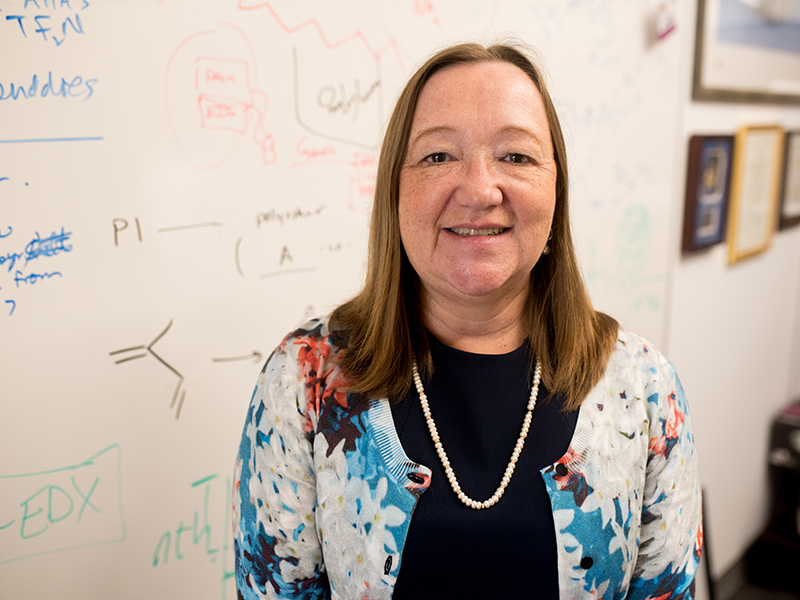Back to Faculty Directory

jfb@che.utexas.edu
512-471-5092
Office Location: EER 3.614
Joan Brennecke
Professor
Earnest F. Gloyna Regents Chair in Engineering
Educational Qualifications
Ph.D., University of Illinois (1989)
M.S., University of Illinois (1987)
B.S., Chemical Engineering, University of Texas at Austin (1984)
Courses Taught
Thermodynamics, Separations
Focus
Ionic liquids, thermodynamics, gas separations, supercritical fluid technology, environmentally benign chemical processing.
Research
Joan Brennecke’s interests are in the development of more environmentally friendly solvents and processes. Of particular interest is the use of ionic liquids and carbon dioxide for extractions, separations, and reactions.
Ionic liquids are organic salts that in their pure state are liquids at ambient temperatures. Although ionic liquids are organic solvents, they exhibit vanishingly small vapor pressures. Negligible volatility means that the most prevalent route for escape to the atmosphere and also exposure to workers – evaporation – is absent. Supercritical fluids are compounds that have been heated and pressurized above their critical temperatures and pressures. At conditions near the critical point, the density of the fluid can be varied from a gas-like to liquid-like with small changes in temperature or pressure to mimic a wide variety of solvents. Supercritical CO2 is nontoxic, nonflammable, abundant and inexpensive. Although it is a greenhouse gas, the use of CO2 in processes does not contribute to global warming since CO2 is not produced.
Although water stable ionic liquids are a relatively new class of compounds, it has been shown that they are suitable solvents for a wide variety of industrially important reactions. Professor Brennecke’s group has been investigating the phase behavior of ionic liquids and has shown that nonvolatile organic products can be separated from them without resorting to the use of traditional volatile organic solvents, as had been done previously. They have also shown that various gases have vastly different solubilities in ILs so they can be used for performing gas separations, either in a conventional absorber/stripper configuration or by using a supported liquid membrane. The overall goal of this work is to understand how the choice of anion, cation and substituents on the cation affects thermophysical properties and phase behavior. Current work focuses on the design and testing of new ionic liquids that possess particularly desirable physical property and phase behavior characteristics, necessary for important separation problems and for use as electrolytes.
Awards & Honors
- Kavli Lecturer, ACS National Meeting, San Francisco, CA, 2014
- E.V. Murphree Award, American Chemical Society, 2014
- National Academy of Engineering, 2012
- E.O. Lawrence Award, Department of Energy, 2009
- Julius Steiglitz Award, American Chemical Society Chicago Section, 2008
- J.M. Prausnitz Award, Property and Phase Equilibria for Product and Process Design (PPEPPD), 2007
- Professional Progress Award, American Institute of Chemical Engineers (AIChE), 2006
- AIChE Area 1a Keynote Address, 2002
- Ipatieff Prize, American Chemical Society, 2001
- College of Engineering Outstanding Teacher of the Year Award, University of Notre Dame, 2000
- NSF Presidential Young Investigator Award, 1991
Selected Publications
- Zhichao Chen, Zixuan Li, Wei Zhao, Ray A. Matsumoto, Matt Thompson, Oscar Morales-Collazo, Peter T. Cummings, Filippo Mangolini and Joan F. Brennecke, “Investigation of multilayered structures of ionic liquids on graphite and platinum using atomic force microscopy,” Langmuir, 2022, 38, 13, 4036-4047. DOI: 10.1021/acs.langmuir.2c00024
- Kimberly R. Bourland, Oscar Morales-Collazo, and Joan F. Brennecke, “Inverse Gas Chromatography as a Screening Technique for Henry’s Law Constants of Gases in Ionic Liquids,” Chem. Eng. Data, 67(2), 2022, 385-392, DOI: 10.1021/acs.jced.1c00838.
- Austin N. Keller, Caitlin L. Bentley, Oscar Morales-Collazo, and Joan F. Brennecke Design and Characterization of Aprotic N-Heterocyclic Anion Ionic Liquids for Carbon Capture, Chem. Eng. Data, 67(2), 2022, 375-384, DOI: 10.1021/acs.jced.1c00827.
- Matthew N. Davenport, Caitlin L. Bentley, Joan F. Brennecke and Benny D. Freeman, “Ethylene and Ethane Transport Properties of Hydrogen-stable Ag+-based Facilitated Transport Membranes,” Membrane Science, 647 (2022) 120300. https://doi.org/10.1016/j.memsci.2022.120300
- Sejoon Park, Oscar Morales-Collazo, Benny Freeman, and Joan F. Brennecke, “Ionic Liquid Stabilizes Olefin Facilitated Transport Membranes Against Reduction,” Angewandte Chemie – International Edition, 61(25), 2022, https://doi.org/10.1002/anie.202202895.
- Thomas R. Gohndrone, Tangqiumei Song, M. Aruni DeSilva, and Joan F. Brennecke, “Quantification of Ylide Formation in Phosphonium based Ionic Liquids Reacted with CO2,” Phys. Chem. B, 125(24), 2021, 6649-6657, DOI: 10.1021/acs.jpcb.1c03546.
- Oscar Nordness, Pratik Kelkar, Yuanyuan Lyu, Michael Baldea, Mark A. Stadtherr and Joan F. Brennecke, “Predicting Thermophysical Properties of Dialkylimidazolium Ionic Liquids from Sigma Profiles,” Molecular Liquids, 334, 2021, 116019. doi.org/10.1016/j.molliq.2021.116019
- Seungmin Oh, Oscar Morales-Collazo, Austin N. Keller and Joan F. Brennecke, “Cation-Anion and Anion-CO2 Interactions in Triethyl(octyl)phosphonium Ionic Liquids with Aprotic Heterocyclic Anion (AHAs),” Phys. Chem. B, 2020, 124(40), 8877-8887. 10.1021/acs.jpcb.0c06374
- Joan F. Brennecke and Benny D. Freeman, “Reimagining Petroleum Refining,” Science, 2020, 369(6501), 254-255. DOI: 1126/science.abd1307
- Oscar Nordness and Joan F. Brennecke, “Ion Dissociation in Ionic Liquids and Ionic Liquid Solutions,” Chemical Reviews, 2020, 120(23), 12873-12902. DOI: 10.1021/acs.chemrev.0c00373






